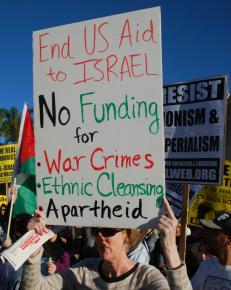Marching against Israel’s war
By
EVEN AS Israel announced that it was winding down its military assault on Gaza, hundreds turned out in several cities across the U.S. to show solidarity with the Palestinian people, and condemn Israel's war and the U.S. government's support for it.
In Boston, more than 300 people mobilized on January 16, Boston's coldest night this winter so far, to protest Israel's attack. This was the latest of almost daily events in Boston for solidarity with Gaza since Israel's attack began.
The protest began at the Israeli consulate, and although the police and consulate security initially tried to prevent protesters from picketing in front of the entrance of the consulate, the picket rapidly swelled to a huge size and defied security.
Protesters blocked the entrance, trapping the consular employees inside at the end of the workday. Employees from the consulate dropped notes out of a window to the protest, which one activist read aloud during the speak out that followed the picket. One said, "The Arabs fought for the land and Israel won. Go back where you came from." Another read, "Go home, you animals!"

"I would love to go back where I came from," one Palestinian woman told the crowd, naming her hometown in Occupied Palestine to wild cheers from the crowd.
Protesters then marched to the State House to protest Democratic Gov. Deval Patrick's attendance at a recent pro-Israel rally. Protesters chanted "Shame on you" and "Massachusetts, now's the time--take the side of Palestine!"
Palestinian activist Salma Abu Ayash called on protestors to join the struggle for Palestine beyond Israel's current attack on Gaza; "Go home and make a sign. Not a lame sign just calling for 'peace,' but one that says no to Zionism, no to racism, no genocide! Call this what it is!"
The demonstrators then marched past Fox News, chanting "Hey Fox, what do you say? How many lies did you broadcast today?" The march ended at Government Center, where the offices of Sens. John Kerry and Ted Kennedy are located. People spoke against the U.S. government's financial, political and military support of Israel.
In Seattle the following day, more than 500 people turned out. They marched through the streets of downtown energetically chantin,g "Long live Palestine, long live the Intifada!" and "Resistance is justified when people are occupied!"
With Israel and the U.S. announcing a unilateral, entirely pro-Israel "ceasefire" that day, Amin Odeh, a leader of Voices of Palestine and participant in the First Intifada, said in an interview, "The fight to free Palestine will continue. We need to ensure that we continue to organize here in the U.S., utilizing the momentum the movement gained due to Israel's latest round of barbarity."
In this vein, student activists in the area are discussing plans to launch campaigns for academic boycotts and divestment from Israel at the University of Washington and Seattle Central Community College.
In San Diego that day, approximately 400 activists held a march and rally in Balboa Park. The march was led by a group of Palestinian-American children, carrying a banner reading "Justice for Palestine! Support the right of return!" The children honored the dead and wounded children of Gaza, and also embodied the future of the Palestine resistance.
In Rochester, N.Y., it was zero degrees outside as about 35 local activists came out for a picket organized by Rochester Against War (RAW).
Activists from the Campus Antiwar Network and Students for a Democratic Society joined forces with RAW, the International Socialist Organization and members of the Arab community to circle-picket a major intersection.
Pedestrians stopped to gaze in the frigid temperatures as protesters chanted, "Free, free Palestine! Democratic Palestine!", "Occupation is a crime, from Iraq to Palestine!", "Hey Obama, we want change in Gaza!", and "Resistance is justified when people are occupied!" People driving by honked repeatedly.
The support the picket received only cemented the level of local opposition to the Israeli assault on Gaza, and the picket ended with a march back to the Anti-War Storefront, a center for local antiwar activism.


